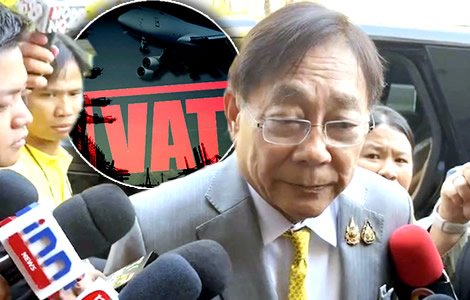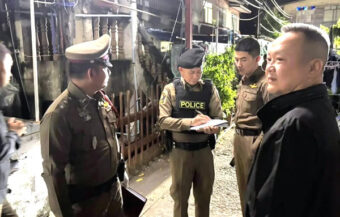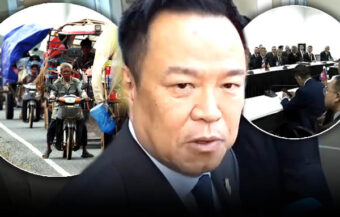A 15% VAT tax plan for Thailand was scrapped after public outcry. While the idea aimed to boost investment and tackle inequality, critics warned it would harm the poor, increase living costs, and damage tourism. Experts suggest gradual tax reforms is critical to growth.
The brief flirtation last week by Deputy PM and Minister of Finance Pichai Chunhavajira with a 15% VAT tax instead of 7% would certainly have severely impacted Thailand’s struggling families. Furthermore, it would have immediately made the country more expensive for foreign tourists. In short order, Prime Minister Paetongtarn Shinawatra scrapped the plan, not before making known her displeasure. However, experts argue that Thailand must adjust its taxation system if it aims to attract more foreign inward investment and as a tool to fight chronic inequality. In conclusion, a higher VAT tax rate may be required, introduced incrementally as part of a plan to regularise and modernise the economy.

A tentative proposal put forward last week by Deputy Prime Minister and Minister of Finance Pichai Chunhavajira to increase Thailand’s effective VAT tax from 7% to 15% received short shrift.
Thailand is seeking to widen its tax base, particularly given future demands on the exchequer for an ageing population.
Furthermore, the country’s low level of growth and a massive influx of cheap imports from China have experts at the Finance Ministry worried about persistently low levels of inflation.
Thailand’s economic growth projected to improve in 2024, but long-term growth remains a challenge
In the meantime, these low levels of inflation feed into persistently lower levels of growth compared to its Southeast Asian partners.
However, the good news is that the economy is growing. This year, it is anticipated that growth will be between 2.7% and 3%. Certainly, this will be an improvement on 2023’s growth rate of 1.9%. That revised figure was surprisingly slower than the 2.5% growth seen in 2022.
In short, given the massive 6.1% contraction of the kingdom’s economy in 2020 and a modest 1.6% growth in 2021, long-term growth for Thailand is in the doldrums. Even so, many analysts, among them the IMF and World Bank, project a country trapped in a low-growth scenario looking forward. Particularly because of its rapidly deteriorating demographics.
In the meantime, the Bank of Thailand urges the government to focus on tackling long-term structural problems. In particular, household debt, the country’s poor education system and fostering inward investment.
Nonetheless, the Pheu Thai-led government of Paetongtarn Shinawatra, backed by her father, former Prime Minister Thaksin Shinawatra, insists that higher growth is possible in the short term.
Bank of Thailand clashes with government over economic policies amid falling household debt
This has led to a clash of opinion between the government and the central bank. For instance, the Bank of Thailand this year implemented tough lending curbs. This has seen auto sales in Thailand plunge by 26.2% since last year. At the same time, the bank announced a reported reduction in household debt in the second quarter. It fell from 90.7% of GDP to 89.8%.
Undoubtedly, with lower levels of growth, a real effort to rein in this figure is required. Presently, it stands at ฿16.3–฿16.8 trillion.
The news that the Ministry of Finance was looking at the VAT rate came from the minister’s lips last Wednesday. It is not clear what is behind the move. Certainly, Minister Pichai was clear that this was simply a proposal to be studied.
Nonetheless, some analysts suggested it was linked to Thailand’s ambitions to align itself with other Organisation for Economic Co-operation and Development (OECD) countries. This is a Western bloc institution headquartered in Paris.
Thailand’s VAT proposal linked to OECD policies on taxation and inclusion of the informal economy
In addition, it is behind Thailand’s controversial proposals and moves to tax foreign residents in the kingdom. The OECD is an ardent proponent of ‘tax justice’ and presently advocates a blanket 15% tax on corporate profits worldwide.
Analysts argue that in order to fully join the OECD and implement its policy programmes, Thailand will also need to integrate its massive black market economy into the presently registered economy.
Most analysts suggest that the grey economy in Thailand represents 50% of real GDP. Certainly, it may even be larger, as the culture in the kingdom is sceptical of government interference.
Therefore, to sweeten the prospect of integrating small concerns, the government may want to bring down personal taxation. Presently, Thailand has an income tax rate of 35% with generous allowances.
Economic analysts suggest that Thailand wishes to reduce personal taxation and corporate tax to widen the tax base. In turn, this would require extra income from Value Added Tax (VAT).
Rather than giving a specific figure, Mr. Pichai later said public feedback must be sought first.
VAT proposal faces criticism while Thailand seeks to balance tax reform and economic competitiveness
At this time, Thailand has a de jure VAT rate of 10%. However, for the last 32 years, this has been reduced to 7%. This has been achieved by royal decrees every time the previous provisions were due to expire.
“We need to gather opinions from various sectors because a VAT increase would have an impact on people,” Mr. Pichai said last Wednesday.
He was speaking at a forum in Bangkok on sustainability. The minister noted that many countries worldwide are cutting tax rates on income.
Indeed, a controversial proposal put forward in the US elections by former President Donald Trump suggested an abolition of income tax to be replaced by tariffs and indirect taxation.
For instance, Minister Pichai said he wanted to reduce Thailand’s corporation tax rate from 20% to 15%. Certainly, this would help attract inward investment.
In particular, he noted that Thailand’s VAT rate of 7% is quite low. For instance, the world norms range from 15–25%.
“Consumption taxes are considered a sensitive issue. However, if we increase the rate in a reasonable and appropriate manner, it could serve as a tool to help low-income individuals. The gap between rich and poor would narrow because we would collect taxes based on the same base for everyone,” said Mr. Pichai.
Minister Pichai argues higher VAT could help fund social programmes and infrastructure development
He argued that higher VAT would mean richer Thais and businesses would, in effect, pay more. At the same time, the government would have more scope to help the poor while also providing an incentive for higher investment. The latter, of course, through a lower corporation tax rate.
“If we set the rate low, it means everyone pays less, and the total revenue collected would be lower. If the rate is increased, wealthier individuals would pay more according to their spending, and the overall revenue would increase. This money could be used for measures to assist low-income people and for building infrastructure to enhance the country’s competitiveness.”
Deputy Prime Minister Pichai furthermore argued that the move was required given the higher number of retired and ageing people. Notably, he mentioned further demands going forward on Thailand’s Social Security funds.
Speaking at the same conference, the permanent secretary at the Ministry of Finance, Lavaron Sangsnit, was more guarded. At length, he noted it would require strong political will. After that, the key was timing. Certainly, the economy needs a stronger recovery.
“Good timing is important,” he concluded.
Proposal to raise VAT withdrawn after backlash from public, political leaders, and opposition figures
Certainly, the proposal produced a storm of protest. Not long afterwards, even Prime Minister Paetongtarn Shinawatra expressed not only concern but vexation at the proposal. Significantly, instead of being seen as a tool to fight inequality, it was seen as an attack on the poor.
Shortly after that, at a meeting at Government House, the idea was shelved, and the PM ensured the news was communicated to the public. Indeed, a detailed statement was issued.
In summary, it confirmed there would be no adjustment of the Value Added Tax to 15%. The statement explained that the Minister of Finance was looking at the tax system. The goal was to boost competitiveness and attract more investment. The statement suggested that any plan implemented may be over a 10-year period.
Finally, the statement assured the public that the Pheu Thai-led government was pursuing a policy of lower costs for ordinary people.
Before that, Dr. Weng Tojirakarn, a former Red Shirt activist, launched an explosive tirade attacking the plan. He warned it only promised death for poor people struggling to make ends meet. Furthermore, he asked why it was being considered.
Political figures join critics of the VAT hike, warning of higher costs for the middle class and the poor
“Reducing inequality? Stimulate investment? The truth is it is useful for people with money—the rich and the super-rich. But for those who have no money or have little money or are poor, there’s only death and death.”
He was joined by fiery opposition spokesperson Sirikanya Tansakul, the People’s Party deputy leader. Mr. Sirikanya took to X to lambast the plan. “Is the 15% VAT increase too much? Those who will be hit hardest are salarymen and the middle class,” she thundered.
Even within the government, the proposal was given the thumbs down. Thanakorn Wangboonkongchana, deputy leader of the United Thai Nation (Ruam Thai Sang Chart) Party, was quick to issue a statement. In short, he warned it would increase the cost-of-living burden on people already financially stretched.
Later, government spokesman Jirayu Houngsub assured the public that in September, the cabinet had already extended the 7% VAT rate until September 2025.
Indeed, a chorus of dissent emerged, including Minister of Agriculture Narumon Pinyosinwat and Thailand Chamber of Coummerce (TCC) boss Sanan Angubolkul. The latter argued that economic growth is too low for such a radical move.
Critics warn that higher VAT will harm tourism and disproportionately affect low-income households
Certainly, it should be noted that a VAT increase of this nature, even over time, is likely to make Thailand a more expensive tourist destination.
However, ultimately, what the government is trying to engineer is a more advanced economy—one less dependent on tourism. Certainly, also one that is regulated and registered.
In short, Thailand aims to become a developed economy driven by exports and manufacturing.
At this time, the proposal has been roundly rejected. However, the reengineering of the economy is still being planned. Mr. Somchai Jitsuchon, a research director at the Thailand Development Research Institute (TDRI), is focused on developing a more inclusive Thailand.
Economic experts suggest gradual tax hikes over time to avoid inflationary pressure and support reforms
At length, he suggests a modest 1% increase by stealth over five years to a rate of 10%. At the same time, he warned that this should not be announced to avoid inflation spikes. He agreed that this may help the government’s funding challenges.
Thaksin calls for more cash flow and predicts a realignment of the world financial system in 5 years
Sirikanya criticises the government’s economic agenda as willy nilly and focused on cash handouts
Financial experts and economists in sombre warning to the government: Hands off the Bank of Thailand
However, he cautioned against reducing income tax on a flat-rate basis. Mr. Somchai argued for the government to use the allowance provisions to favour the less well-off.
Certainly, a lower income tax rate is welcome, as would a lower corporation tax rate.
The economic expert particularly advised that Board of Investment (BOI) concessions should be scrapped at the same time.
By doing so, the government could ensure a more equitable and efficient tax system, paving the way for sustainable economic growth while addressing critical structural issues in Thailand’s economy.
Join the Thai News forum, follow Thai Examiner on Facebook here
Receive all our stories as they come out on Telegram here
Follow Thai Examiner here
Further reading:
Thaksin calls for more cash flow and predicts a realignment of the world financial system in 5 years
Ung Ing congratulates Trump as Thailand uneasily confronts the meaning of his second Presidency
Paetongtarn’s government set to tackle the evil of chronic debt in Thailand as the tide still rises
Srettha’s crisis is not just an economic one, it is a ‘3D debt crisis’ that is strangling GDP growth
Zombie Thai firms holding back economic growth as they struggle just to pay interest on bank debt
Incoherent government economic policy clashes with Bank of Thailand’s efforts to rein in debt
Economy is in troubled waters with fears for both exports and foreign tourism as 2023 winds down
Thailand faces an economic future of low growth despite Srettha’s plans because of a darker world
Another dip for the baht or are economic danger signals flashing for both Thailand and the world?
Police chief confirms 2 dead with reports of at least one more fatality in Bangkok mass shooting


















